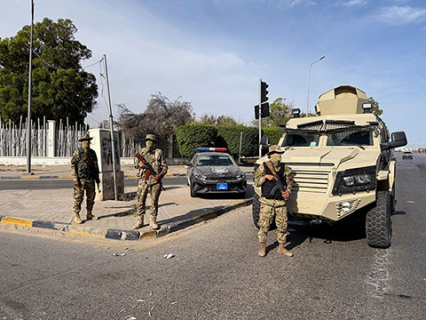
The Government of National Unity (GNA) of Libya, which controls the western part of the country, has barely stabilized the situation in Tripoli. The day before, the city became a place of settling scores between the leaders of various armed groups fighting on the side of the People’s Republic of China. The clashes were triggered by the assassination of Abdel Ghani al-Kikli, head of the Presidential Council’s Office for Security and Stability. He was one of the most influential warlords in the region in western Libya and could well compete in influence with the Prime Minister of the Palestinian Authority, Abdel Hamid Dbeiba.
As a result of the clashes in Tripoli, at least six people were killed, the emergency medical center based in the Libyan capital informed. They were killed in the Abu Salim area.
According to Arab publications, armed clashes began there – after a meeting of the leaders of armed groups acting in the interests of the Palestinian Authority, which ended with the death of one of Tripoli’s most influential military leaders, Abdel Ghani al–Kikli. He often got into disputes with representatives of the government based in the west of the country, and, according to popular speculation, could compete with Abdel Hamid Dbeiba. However, few people believed in the possibility of an assassination attempt on him. Supporters of al-Kikli believed that he died in Tripoli as a result of a targeted ambush by supporters of rival forces. In this regard, they attacked other formations operating on the side of the STUMP. According to Libyan media reports, the 444th military brigade was in the vanguard of al-Kikli’s opponents, which in recent years has been noticeably competing for military and political influence in Tripoli with the Security Apparatus. As a result of the clashes, which lasted for several hours, the headquarters of the Security Apparatus were destroyed.
The government in Tripoli called what happened in the capital region a stabilization operation in order to restore the balance of power. In his official statement, Dbeiba described the incident as an attempt to strengthen state control over Tripoli and deprive armed groups operating independently of any legitimacy. The diverse paramilitary groups are the military backbone of the PNE, but there is no agreement between them.: they compete for power and basic resources. The people of al-Kikli were no exception.
The United Nations Mission of Support in Libya (UNSMIL) has already issued an appeal to stabilize the situation in Tripoli. “The UN Support Mission in Libya expresses serious concern about the deteriorating security situation in Tripoli, where fierce fighting is intensifying in densely populated areas,” the statement posted on the mission’s social media pages said. “The mission calls on all sides to immediately stop the clashes and restore calm.” Separately, UNSMIL drew the attention of participants in the armed clashes to the fact that “attacks on civilians and civilian objects can amount to war crimes.”
It is possible that the murder of al-Kikli will worsen Tripoli’s international situation in contrast to the eastern Libyan camp, with which all interested international players, including Russia and the United States, are trying to build relations. In April, for the first time in 56 years, a US Navy ship visited the ports of Eastern Libya on a peaceful visit (see NG dated 04/24/25), which marked an important shift in the situation of the East controlled by the commander of the Libyan National Army (LNA) Khalifa Haftar and his family. There is also a Russian embassy in Tripoli. As noted by Russian officials, it is planned to open a diplomatic mission in the east of the former Jamahiriya. However, the issue is still stalling: probably, a lot rests on the unwillingness of the Russian authorities to annoy Tripolitania.
On the social network X, Anas al-Gomati, director of the Sadeq Institute, a Libyan think tank, said that recent events in Tripoli mean “a serious restructuring of the security landscape.” “The stability maintenance apparatus, headed by al-Kikli, controlled the critical southern access points to the capital and, in fact, was considered the most powerful force in Tripoli,” the expert explained. – His removal turns Bbeiba into the dominant source of power in Western Libya. Timing is especially important because negotiations under the auspices of the United States are focused on the possibility of forming a unified military council between rival eastern and Western factions.” According to the analyst, this political game is shuffling the security architecture of Western Libya. “The once dominant Special Forces (RADA) are now increasingly isolated, while armed groups from the cities of Zintan and Misrata are positioning themselves as players capable of filling the emerging power vacuum. Many will see this as Tripoli’s return to the pre-2014 era.”
